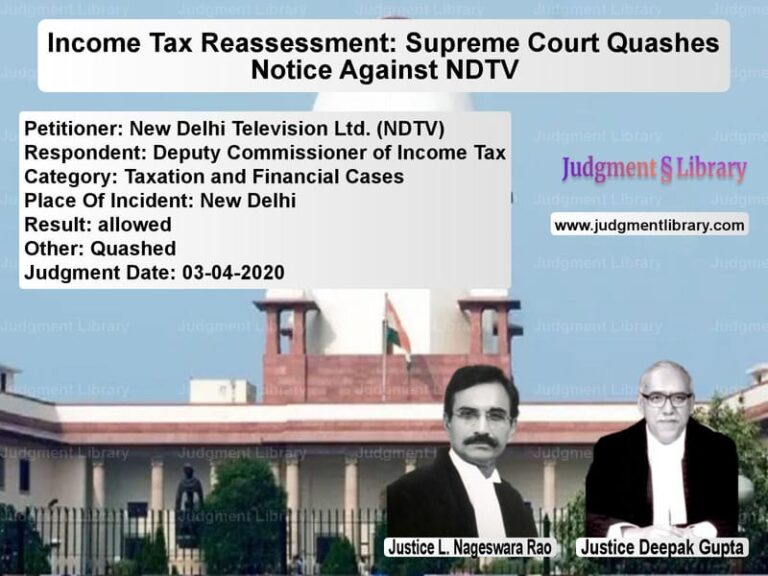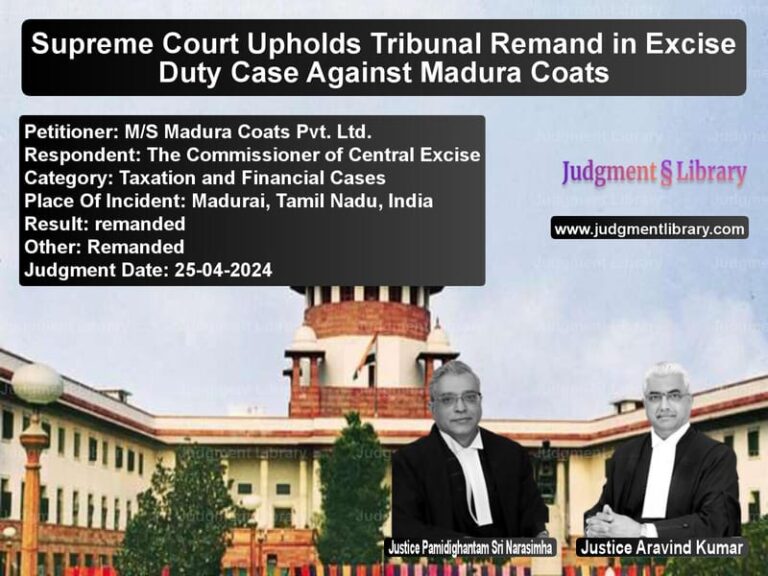Supreme Court Ruling on Auction Sales and Debtor Rights: Key Legal Principles
The case of P.M. Abubakar vs. State of Karnataka and Others is a landmark judgment that clarifies the principles surrounding auction sales, debtor’s rights, and the jurisdiction of cooperative authorities in setting aside confirmed sales. The Supreme Court delivered its judgment on November 17, 2016, resolving a long-standing dispute over loan recovery proceedings initiated by a cooperative bank.
Background of the Case
This case arose from loan recovery proceedings initiated by Mahalakshmi Co-operative Bank Limited against the debtor, Keshava N. Kotian. The bank obtained an award against the debtor on January 2, 2004, for the recovery of Rs. 13,65,899.70, with an annual interest rate of 19%. As the debtor failed to comply with the order, the bank proceeded with execution and eventually put the mortgaged property up for auction.
Despite multiple opportunities and notices, the debtor did not settle his outstanding dues. As a result, his property was auctioned on September 10, 2008, and purchased by P.M. Abubakar, the appellant. However, the debtor subsequently challenged the auction sale through various legal proceedings, attempting to set aside the sale.
Legal Issues Considered
- Was the debtor entitled to set aside the auction sale after its confirmation?
- Did the Deputy Registrar have jurisdiction to entertain an appeal against the confirmed sale?
- Was the Karnataka High Court correct in intervening and setting aside the auction sale?
- What is the extent of protection available to auction purchasers under the law?
Arguments Presented
Appellant (P.M. Abubakar – Auction Purchaser) Arguments:
- The auction sale was conducted lawfully and in full compliance with legal procedures.
- Multiple opportunities were provided to the debtor to settle his dues, yet he failed to do so.
- The sale was confirmed, a sale certificate was issued, and ownership was legally transferred.
- The debtor had no legal grounds to challenge the sale after confirmation.
- The Deputy Registrar exceeded his jurisdiction by entertaining an appeal against a confirmed sale.
Respondent (Keshava N. Kotian – Debtor) Arguments:
- The property was undervalued, and the sale price was unfairly low.
- He had deposited substantial amounts after the auction, demonstrating his intention to settle the dues.
- The Karnataka High Court had rightly intervened to set aside the sale in the interests of justice.
Supreme Court’s Observations
The Supreme Court thoroughly analyzed the debtor’s conduct and the legal framework governing auction sales under Section 89A of the Karnataka Cooperative Societies Act and Rule 38 of the Karnataka Cooperative Societies Rules.
The Court emphasized:
“Once the auction sale is confirmed by the competent authority, it is not open to be set aside except as per the statutory provisions. The Deputy Registrar had no jurisdiction to interfere.”
The Court found that the debtor had ample opportunities to settle his dues but failed to do so. Moreover, once the sale was confirmed and ownership was transferred, the debtor had no legal standing to challenge the sale, especially without complying with legal requirements.
Final Judgment
The Supreme Court ruled as follows:
- The Karnataka High Court erred in overturning the confirmed auction sale.
- The debtor’s appeal was dismissed as he repeatedly failed to comply with financial obligations.
- The auction purchaser’s appeal was allowed, thereby restoring the validity of the sale.
- The Deputy Registrar’s decision to set aside the sale was declared without jurisdiction.
The appeal was allowed with no order as to costs.
Impact of the Judgment
The Supreme Court’s ruling has significant legal and financial implications:
- It establishes that a confirmed auction sale attains finality and cannot be arbitrarily set aside.
- It upholds the rights of auction purchasers and prevents undue litigation aimed at delaying the transfer of ownership.
- It reinforces that debtors cannot misuse legal proceedings to indefinitely delay financial recoveries.
- It clarifies the limited jurisdiction of cooperative authorities in interfering with confirmed sales.
Conclusion
This Supreme Court judgment underscores the importance of upholding the legality of auction sales. It ensures that auction purchasers’ rights are protected against prolonged and unjustified litigation. By restricting the ability of debtors to challenge confirmed sales without fulfilling their financial obligations, the judgment reinforces the integrity of financial recovery mechanisms under Indian law.
Don’t miss out on the full details! Download the complete judgment in PDF format below and gain valuable insights instantly!
Download Judgment: P.M. Abubakar vs State of Karnataka a Supreme Court of India Judgment Dated 17-11-2016.pdf
Direct Downlaod Judgment: Direct downlaod this Judgment
See all petitions in Contract Disputes
See all petitions in Debt Recovery
See all petitions in Property Disputes
See all petitions in Judgment by Anil R. Dave
See all petitions in Judgment by A M Khanwilkar
See all petitions in allowed
See all petitions in supreme court of India judgments November 2016
See all petitions in 2016 judgments
See all posts in Civil Cases Category
See all allowed petitions in Civil Cases Category
See all Dismissed petitions in Civil Cases Category
See all partially allowed petitions in Civil Cases Category







